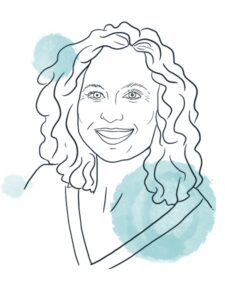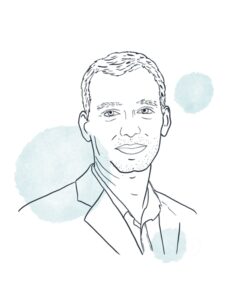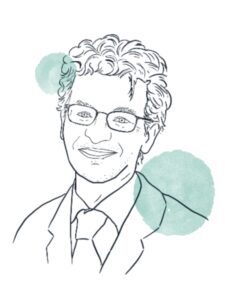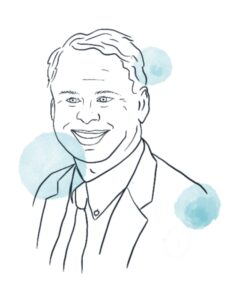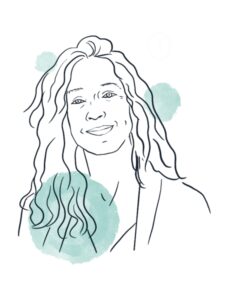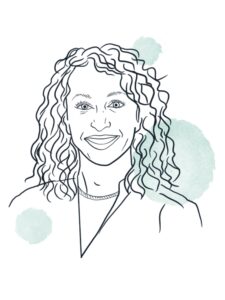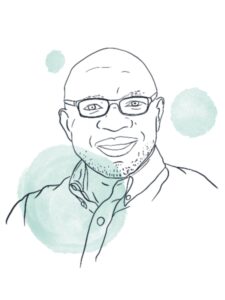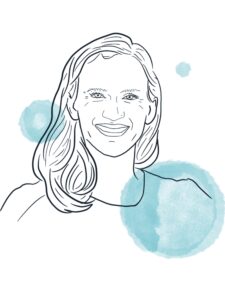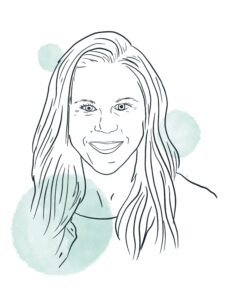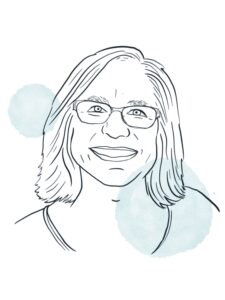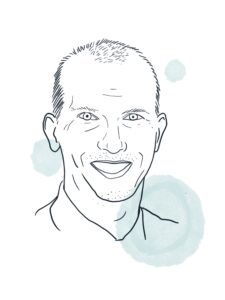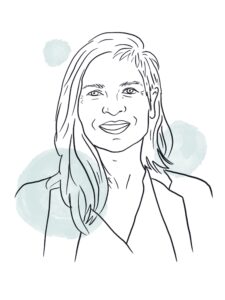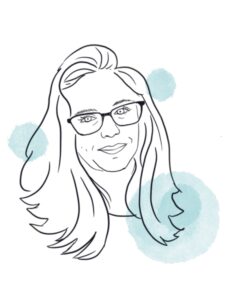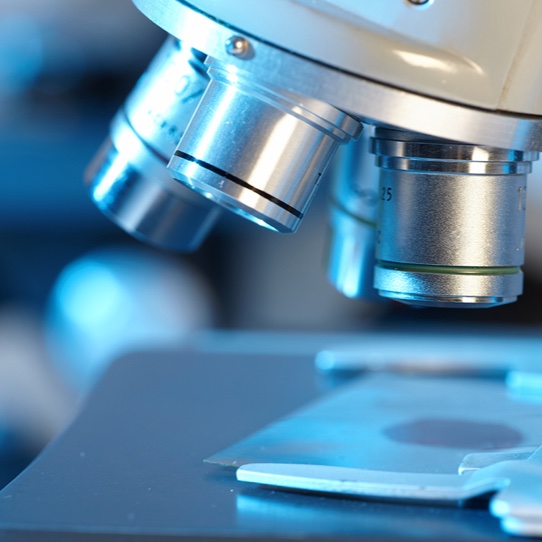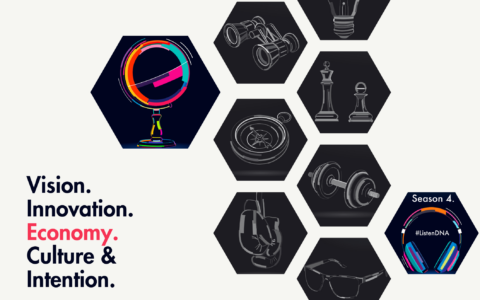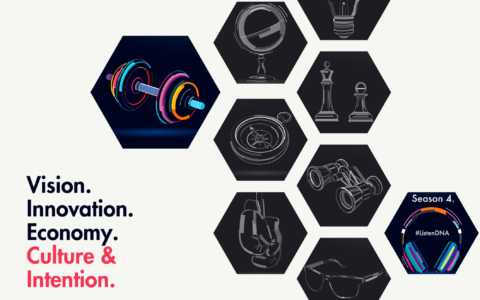PRODUCER’S CUT – Nashville’s Opportunity: Eco-Action or Anxiety
In this excerpt from a Climate x Health Twitter Spaces live chat, experts from Vanderbilt, Oak Ridge National Laboratory, and others discuss hope and want listeners to be energetic and reject “doomerism”. All this while embracing reality and emphasizing teamwork without ego to accomplish individual and systemic goals. This conversation was hosted live from the AAMC conference in Nashville.
Equity, Energy, Action: The climate opportunity
In this excerpt from a Climate x Health Twitter Spaces live chat experts from Vanderbilt, Oak Ridge National Laboratory and Philips take an expansive look at the disparities of climate change and its impact on health and well-being now and in the future. Listen in to hear how health and climate are fused and get ideas on how to find sustainability opportunities in medicine, research and business. This conversation was hosted live from the AAMC conference in Nashville.
DNA: Discoveries in Action Season 3 Episode 9 Transcript
Nashville’s Opportunity: Eco-Action or Anxiety?
Moet Ashfaq: There are two sides to this story. One is very bleak, and other side, which is hope and opportunity.
Mike Vandenbergh: We’re seeing half the states though, including almost all those in the southeast, aggressively trying to stop decarbonization. So, that’s a challenge. And then we’re seeing lots of cities like Nashville, many of them have made commitments. Too many cities haven’t followed through yet, but we’re seeing real progress in that area. So when we put it all together, we’re not doing enough, but I think there’s sufficient momentum out there that we can all make a difference by pushing in the different areas where we have some influence in our lives. I’m optimistic that we’re going to get to a place where we’ll have very substantial US emissions reductions over the next five to 10 years.
Reed Omary: If we’re going to act together, we have to shift from partisanship to partnership, and it’s really important that we step out of our usual lanes and meet others and meet others with different perspectives and different expertise.
Kendra Abkowitz: I hear from many that they are told or feel that their individual actions are a drop in the bucket, that simply won’t be meaningful enough to matter. And while there is some validity in that sentiment, I really think that sort of pessimism leads to eco-anxiety and doomerism. And so I’d like to push back against it, because I think number one, doing nothing isn’t an option. It’s not an option for any of us. And number two, I really believe that once individual actions and advocacy are noticed and they’re modeled by others, whether it be family, friends, neighbors or colleagues, and that serves as a catalyst for cultural shift, and that drives momentum, that’s meaningful.
Clark Buckner: Hi there. I’m Clark Buckner. And on behalf of the DNA podcast team, welcome to the producer’s cut episode of a hybrid realtime conversation we had about climate and health on Twitter Spaces at the AAMC annual meeting in Nashville. In fact, we had two separate conversations as part of the podcast’s month-long focus on the intersection of climate and health.
This episode is a condensed version of the “Nashville’s Opportunity: Eco-Anxiety or Action.” It was a fascinating conversation with expert voices from around Tennessee and London about how local policies and politics and more impact the planet and our health, and what we can do right now to improve both.
We’re about to dive right in. But first, if you want to learn more about the guests or see a list of suggested readings, then head on over to listendna.com to find the climate and health page.
All right, here we go.
Holly Fletcher: I’m Holly Fletcher, and I am the director of Media Equity and Emerging Platforms at Vanderbilt University Medical Center. And I am delighted to have all of you here today because this is a first for our podcast. We are live from a big conference in Nashville. And the podcast is really three seasons of looking at the intersection of health, wellbeing, and society with very culturally relevant conversations that lean into what people are talking about, what is on their mind, and how that impacts health. And today I am joined by Reed Omary, and he and I are co-curators for the day. And I will have him say hi.
Reed Omary: Thank you, Holly, and thank you everyone for joining us. I’m Reed Omary. I’m the chair of Radiology at Vanderbilt University Medical Center. I’m a parent, and I’m also a climate activist. So, I’m so glad that we are here today to discuss the intersection of climate change and health at the American Association of Medical Colleges 2022 meeting that’s being held here in Nashville simultaneously to COP27. Coincidence or not, Holly?
Holly Fletcher: I don’t believe in coincidences. Everything is planned. And this has been on the books for a while, and I am glad that COP27 decided to host their event while we are hosting ours. So, thank you, Reed. And to kick off, I’d like to have our speakers introduce themselves.
Moet Ashfaq: Thank you very much. My name is Moet Ashfaq, and I’m a research scientist at Oak Ridge National Laboratory where I study earth system processes that drive climate variability or climate change. And I’m very excited to be involved in today’s discussion because there can be no denying that climate change is happening, even if we disagree about its cause. Therefore, we need dialogues where climate change implications are discussed and understood from scientific and societal perspectives.
Kendra Abkowitz: My name is Kendra Abkowitz. I am Chief Sustainability and Resilience Officer with Office of Mayor John Cooper for City of Nashville and Davidson County. My work touches a whole host of different environmental areas, anything that relates to air, water, land, solid waste, land use, development, planning, a whole host of different things. And so like my fellow co-panelists, I’m really excited to be here today. This is a hugely important topic, and there isn’t a day that goes by that I don’t get to touch an example of how climate change is affecting our city, and beyond that, public health, so really excited to be part of today’s important conversation.
Eva Parker: Hello everyone. I’m Dr. Eva Parker. I’m a dermatologist and core faculty in the Center for Biomedical Ethics and Society at Vanderbilt University Medical Center. I’m also an associate editor for the Journal of Climate Change and Health and co-chair of the American Academy of Dermatology’s Expert Resource Group on Climate Change and Environmental Affairs. And I’m also on the mayor’s Sustainability Advisory Council. I’m really excited for this conversation because multidisciplinary collaborations are essential to addressing climate impacts on health and health disparities, and I think that this conversation today and the one tomorrow are going to really embody that. So thank you for having me.
Holly Fletcher: And last but not least, Mike.
Mike Vandenbergh: Thanks so much, Holly. It’s great to be with this awesome panel. I’m a professor at Vanderbilt Law School, but my work really is at the intersection of law and social science. And with support from the Carnegie Foundation, we’re looking at how we can broaden the base of support for climate mitigation by bringing moderates and the center right into the conversation about climate change. And bypassing polarization climate in some studies is the most polarized issue in the US today.
Holly Fletcher: Well, thank you all for being here. I have had the pleasure of getting to know each of you before this. And Moet, I’d like to start with you. Will you give us a rundown of where we are from a science perspective?
Moet Ashfaq: Well. thank you for asking this question. So as a scientist by profession, I’m responsible for communicating science subjectively and avoiding sensationalism. However, I still have to admit that inaction in reducing greenhouse gas emissions will lead us to nothing less than a disastrous future for the coming generations. We already have warmed up one degree since the industrial revolution, like you can say 1850s. And remember that additional warming causes a compounding impact, which means that if we added another degree of warming, that does not mean just doubling the frequency or severity of extremes that we have today. In reality, we would see significantly more severe weather in climate extremes than just their doubling. And also remember that the rate of global warming is also accelerating, which means if we took more than 150 years to get to this one degree warming, we expect that in next 15, 20 years, we will be 1.5 degree warmer.
So, that’s also accelerating, which is alarming, but I would also like to point out the other side of this thing that we sometimes miss, that we also know that the world today knows more about the consequences of climate change than it ever knew before. So as a result, there has been a remarkable shift in the reliance on, I’ll say, renewable and clean energy solutions. Also from the science perspective, there is more reliable understanding of how the earth system reacts to increasing greenhouse gases, which is helping communities plan for mitigation, if that’s an option, or for adaptation. And lastly, I will say that there is a huge opportunity for scientific innovation in the area of carbon sequestration or carbon capture where the government is and investing billions of dollars, which may shape and stimulate the economy in uniquely. So, I’ll say that there are two sides to this story. One is very bleak, and other side, which is hope and opportunity.
Holly Fletcher: Mike, how about you? Let’s have you give a very national perspective on where conversation is right now. What is that friction, or where is the collaboration between public and private sector?
Mike Vandenbergh: Thanks so much. So, I agree with everything I just heard about the climate science. And then the question is, how does society respond to the climate science? I focus on both public governance and private governance. And since we’re just coming off of the midterms, it’s worth spending a moment on the public governance side before we turn to the private side. On the public side, of course, we’re not really sure who will control the House of Representatives, right? As of this morning, it looks like it’ll be a very narrow majority by the Republicans. Looks like the Democrats have held the Senate. And of course, the Democrats have the White House. The Supreme Court in a recent decision, in West Virginia versus EPA, a signal to EPA that it can’t take a broad interpretation of existing statutory authority. So if we’re going to see further action on climate change, it’s going to be through legislation, through interpretations of existing cases, and through state and local action.
I’m glad we have Kendra on board to talk about what Nashville is doing, but we’re also going to be looking to private sector action. Right now, climate change is the most polarized issue, as I mentioned earlier, in many polls among all issues in the US. And what we’re finding in the work we do is that people are not really picking policies based on the substance of the policy. Instead, they are deciding which policy fits within their identity or partisan group, and then they’re following along. And so a key in this whole process is to think about how climate change can avoid being boxed into being just a liberal or progressive idea. It needs to be supported by liberals and progressives. But in our constitutional system, 18% of the US population controls 52 votes in the Senate, so we have to be thinking broadly as we reach out.
And I think the good news is that there’s $370 billion in the inflation reduction act, the largest climate bill in our lifetimes that just passed. And much of that is pretty bulletproof, even if the Republicans take the house, because much of it is provided for tax incentives and mandatory spending that are not subject to easy rescissions by one body of Congress. So, I think we’re going to get a big pulse of funding that will help support uptake of clean power and renewable energy, uptake of electric vehicles, uptake of home heating and cooling equipment that’s much more efficient, and so forth. And so I think we can all be optimistic that the federal government is probably going to help us, along with the private sector, reduce carbon emissions by about a billion tons a year by 2030, which is roughly a 40% reduction from 2005 levels. Not where we need to be by any means. 50% reduction from 2005 levels is the current commitment made by the Biden administration as a part of the Paris Agreement process, but it’s getting us in the right direction.
The second thing I would say is that even if the federal government doesn’t do as much as we’d like it to do, we are seeing remarkable movement in the private sector. Just an odd example that helps bring more people to the table is Walmart has committed to a billion tons in carbon emissions reductions by 2030 through its supply chain, and it’s working with major environmental groups to make sure that it’s making good on those commitments. We’re seeing this kind of thing globally. We’re seeing supply chain pressure to decarbonize around the world. Over 300 companies have committed to a hundred percent renewable power. About half of the states are also acting aggressively. California’s adopted at 2035 all electric vehicle sales policy, which been adopted by about a dozen other states.
We’re seeing half the states though, including almost all those in the southeast, aggressively trying to stop decarbonization. So, that’s a challenge. And then we’re seeing lots of cities like Nashville, many of them have made commitments. Too many cities haven’t followed through yet, but we’re seeing real progress in that area. So when we put it all together, we’re not doing enough, but I think there’s sufficient momentum out there that we can all make a difference by pushing in the different areas where we have some influence in our lives. I’m optimistic that we’re going to get to a place where we’ll have very substantial US emissions reductions over the next five to 10 years.
Holly Fletcher: Kendra, you were name checked quite a few times in there. Let’s hear from your perspective.
Kendra Abkowitz: Yeah, I completely agree with what fellow panelists have mentioned. I think there is great interest and enthusiasm around climate action within Nashville, which is really, really great news. One of the things that is very refreshing about serving in my role is more often than not, I find that most Nashvilleans are incredibly supportive of trying to do the right thing. Where the disagreement comes down with is perhaps how your prioritizing actions or how you’re funding them. And so that’s really good news from my perspective. We’ve also done, I think in Nashville, a really good job of planning how we’ll take climate action, but we’ve really failed as it relates to execution historically, and probably a real strategic and coordinated sense. And I think Mike alluded to that. What I think is also really exciting about Nashville’s actions right now is we’re recognizing that we really need to leverage multidisciplinary partnerships to get this done.
And I know several of the panelists either mentioned that in their introductions or in their responses today. The data and science is showing us what needs to be done, but we really need to come together and leverage multidisciplinary expertise to solve these complex challenges. And so one of the things that I like about Nashville’s approach is we’re using our sustainability advisory committee and various subject matter experts throughout the community who do represent the private sector, who do represent academia, nonprofits, individual residents to get them to take part in this action. And from metro government’s perspective, we’re also seeing great strength and partnerships across our departments and trying to recognize the co-benefits associated with climate action. Mike alluded to doing what we can to make this a nonpartisan issue, and I think trying to recognize those co-benefits is something that I am focusing on in my role as well.
We’re really trying to take bold action to reduce greenhouse gas emissions associated with energy consumption in metro government, whether that be through partnerships with NES or with TBA, as well as looking at our build infrastructure here and how we can increase efficiency of those operations and/or greening of the energy supply getting to them. We’re also trying to take bold action as it relates to electrifying our fleets, so trying to reduce those carbon emissions that come from the transportation sector, and then also investing in tree canopy. And that’s just, again, a handful of things that I think are related to what we’re trying to do within Metro Nashville.
Reed Omary: It’s in interesting, the conversation thus far has emphasized several key points, and I think especially in the United States now, with our partisanship and the sense of identities that come with that, we’re hearing if we’re going to overcome climate change and if we’re going to act together, we have to shift from partisanship to partnership. And it’s really important that we step out of our usual lanes and meet others and meet others with different perspectives and different expertise, just like we are doing today. On this conversation, I just wanted to emphasize that’s the way to do it, and the way not to do it is to toss mashed potatoes at renowned works of art. That’s really the opposite of collaboration. That really is a… I don’t know what that really does accept harm. What we’re trying to do, and I wanted to just open this up to get some other perspectives on what collaboration might look like stepping across our various areas.
Mike Vandenbergh: I can give you, Reed, a very good example of that, and then defer to others because we have so many people on this panel who are working across disciplinary lines. But we recently received funding to study the uptake of electric vehicles, and we have a joint project with Tina Harder at the Vanderbilt Medical Center who is a respiratory epidemiologist, and we’re looking at the maternal and child health implications of converting from fossil fuel vehicles to electric vehicles. And the role I play, as a lawyer and someone who works with social science, is to try to understand how we can study and communicate those benefits in ways that do exactly what you talked about and what Holly was talking about, so that when a politician is showing up in a neighborhood, they can have concrete information about the human health benefits that will arise in addition to the climate benefits and other benefits and hoping that those kind of things make a difference.
If you combine decarbonizing the electric grid, which is very doable, with electrifying vehicles and electrifying buildings, we can get, according to a study that Jonathan Gilligan and I did, a physicist at Vandy, about 70% emissions reductions in the US. And that’s very doable, even given the fraught political system we have today.
Holly Fletcher: That is a really great question, and I am curious to hear that fraught political environment goes hands in hand with this sense of doom that a lot of people across the United States feel. What can one person do? What kind of action can people take? And it strikes me, and this is really the energy behind what we’re here to do today, is inspire those individual people to really look for how they can be leaders in their lives and how they can work together to inject the climate literacy and action and awareness in all parts of their lives. This podcast chat is an example. We are elevating this conversation. So, my overarching question is, how do you all help those around you in your spheres embrace action and hope rather than give in to this sense of doom and gloom. And Eva, we’ve not heard from you in a bit, so let’s kick it off with yourself.
Eva Parker: Thank you, Holly. So this afternoon, my husband and I were at the British Museum, and it’s funny, Reed, because the whole topic of the stop fossil fuel, folks throwing food items at precious pieces of art came up and we had a robust discussion of it as we were looking at priceless pieces of history. I think where I really settle is that I’m too optimistic to think fatalistically or to be an nihilists. It’s hope that my actions and the actions of others will be the necessary wave of change that improves planetary health, is what keeps me going and sustains me. And I hear from many that they are told or feel that their individual actions are a drop in the bucket, that simply won’t be meaningful enough to matter. And while there is some validity in that sentiment, I really think that sort of pessimism leads to eco-anxiety and doomerism.
I’d like to push back against it, because I think number one, doing nothing isn’t an option. It’s not an option for any of us. And number two, I really believe that once individual actions and advocacy are noticed and they’re modeled by others, whether it be family, friends, neighbors or colleagues, and that serves as a catalyst for cultural shift and that drives momentum that’s meaningful. For me in dermatology, I’ve done a lot of advocacy, largely through lectures and teaching, to make sure that my colleagues are climate literate on the vast number of impacts on skin disease and the way we practice dermatology and how our practice impacts greenhouse gas emissions. And I think there’s a lot of simple steps that we can each take within our individual spheres. And that sort of grassroots movement and momentum really does grow, and it begins to overlap and our spheres and circles begin to overlap as evidenced by this conversation here today,
Reed Omary: Eva, when you mentioned discussing with other physicians or nurses or anyone else within the healthcare system about what we can do to address climate change, do you ever find that those individuals, they may consider it on a personal level, what they do at home, but they haven’t really thought about it from what they might do at work?
Eva Parker: Absolutely, 100%. And I think it’s just reframing the conversation and saying, well, those things that you’re talking about that you do at home, let’s pivot and look at how we can make similar changes here in our office and in our practice and look at this through a different lens. And once you sort of guide them, you don’t have to take them far. People are very observant, and I find that people very quickly, once you just flip that switch for them, they begin to notice and see the waste and the space for improvement within their own workflows.
Moet Ashfaq: This is Moet. I just want to add a little bit. I think the dialogues like this are very important, and these are largely missing in our discussions these days. Earlier on, the discussion was more about, is climate change happening? Is it real? And now it has shifted to, what is causing climate change? And to some extent, we are still debating whether humans are causing it or nature is doing it. But in my opinion, I think it is now time to move on. Regardless of our beliefs about the drivers of climate change, we should start talking about its implications, connecting science with society. And I think empowering communities to deal with the unfolding challenges is the need of the hour. And for that, dialogue like this is, I think, very important.
Mike Vandenbergh: I totally agree with that. And I was on a panel in Washington not long ago where the head of environmental health and safety for one of the big tech companies pulled me aside after a talk and said, “Even though we’re under pressure from a lot of different sources to decarbonize, it’s really attracting and retaining the best employees that drive so much of what we do.” And my intuition, I mean not researched it, is that in the medical sector, that has to be a huge driver. And I would just add that we all play lots of different roles. We are personally, we’re investors. We have a pension fund or something like that. We go into a store and we’re consumers. And many companies are affected by very small profit margins so that it matters what you do. We have an effect on the people around us, in our family. Household activity, just to buy LED light bulbs has reduced US carbon emissions by 130 million metric tons a year over the last several years.
That’s a tremendous amount, just a small thing like LEDs. We influence others through how we vote and how we engage in civic activity. So, I think if we think about all these different roles that we play, there actually is an enormous amount we can do.
Kendra Abkowitz: And I’ll just kind of take it home it with a slightly different addition here, and that’s that I think when I get asked a question, “Well, why should I take action? We’re already not going to meet our targets, would that ship has sailed. Climate change is here.” I’d like to again remind all of the reasons why we should be taking climate actions for reasons beyond just climate change. So, there’s this significant nexus, and I think Mike and others we’re just alluding to this, when we make investments in our home to make it more energy efficient, that’s creating jobs for people. That’s then transitioning into public health impacts. When we ask folks to engage in activities at the local government level, that’s creating a more engaged and literate citizenry. And so I tell folks, okay, so maybe your climate action won’t get us to our targets, but it is going to result in tangible benefits in our community today, and that matters, right? So, I try to remind folks of that as well.
And I think that helps broaden the conversation and bring in actors who might otherwise not have engaged in particular behaviors or actions.
Holly Fletcher: I’m very heartened and really inspired by the comments that we’ve just heard. My background is as a journalist who has really made my career in making wonky, nerdy information sexy, if you will, because we all know that sensationalism sells. If it bleeds, it leads. And that is my largest, I guess, pet peeve right now or complaint that I’ve got with a conversation as a whole, that we are hearing constantly the doom and the gloom, and we’re not amplifying the conversations about how to get involved.
Moet Ashfaq: Unfortunately, without sensationalism, we may not have much action on climate change. That’s what the reality is. But I think there are many ways that we can present science objectively without having too much sensationalism in it. There are many examples which are really happening that can be used to make a case. For example, I’ll just take an example of hot extremes. That’s the most common occurrence of when there’s an increase in global temperatures, and we know that the heat waves are becoming more frequent. And the sad thing about it is that it may have a disproportional impact on the less fortunate and the less resource of communities because they don’t have access to solutions to [inaudible 00:28:18] heat strokes. You may not know, but in the third world, the farmers in those countries have to work outside no matter what, so they’re always exposed to the danger of these strokes.
And the homeless people in the first world, and even in the third world countries are at the greatest risk for these extremes. So, we can provide these real life examples to make a case that we don’t really need to say that what’s going to happen 20 years down the road or 30 years down the road. We have examples from today that can be used to make the case stronger. You may know that in a few months earlier in Pakistan, again, was devastated by catastrophic floods. And this is the second catastrophic flood in 12 years. And the millions and hundreds of millions of people are underwater, and the water is still there. It has not evaporated. It has nowhere to go. And as a result, people died, and people are still dying because of the health risk that they have after as after effect. So, these are real life examples that can be used to make a case. So, we don’t really need to sensationalize results from the same model simulations or from the data. We can use the real life examples to convincingly make the governments understand that the risk is real.
Eva Parker: Yeah, absolutely. And I think that our last guest raised a really important aspect of climate change, which is the health impacts from extreme weather events. And for those of us in healthcare, the paradigm has shifted and will continue to shift. We’re entering a new era of climate medicine where we will face expansive climate driven increases in disease burden and medical demand. And I think that’s especially true in the global south where resources and resiliency are minimal and climate impacts are disproportionately large. And so with things like flooding in Pakistan, you do see amplification of things like dengue and malaria and other vector-borne diseases, diarrheal diseases like cholera. And it’s a huge concern because millions of people are displaced. And while some may be internally displaced, we’re increasingly seeing climate migration where people are leaving their countries and migrating to other regions of the world to escape the impacts of climate change and extreme weather events.
And with that migration comes disease. And it’s something that we all have to be aware of, and I think it does really highlight the inequities that we have not only locally in our own communities where people of color and those of lower socioeconomic status are disproportionately impacted by air pollution and heat, a lot of that is due to the fact that things like factories and industries and highways have historically been cited in those neighborhoods. And part of that plays back to the effects of redlining that happened in the 1930s, which was historical racist housing practices.
And that has an enduring legacy today. But in addition, there is enduring legacy from imperialism and colonialism that have affected a vast swath of the world. And we now sort of begin to talk, when we talk about climate and climate impacts, talk about the global north and the global south, and it does really hit home the immense inequities and the inequities on health. But I think all of us as physicians in the US need to be aware of these climate effects in far off places because these things are beginning to happen closer to home. We’re seeing endemic transmission of things like [inaudible 00:32:21] and dengue, and even malaria in the southern United States. And so these things will be knocking on our door sooner rather than later.
Reed Omary: Eva, all excellent points. You’re currently in London right now, and how would you say the, there’s a difference between the UK and the United States in the recognition that climate care is indeed healthcare?
Eva Parker: Yeah, I think that’s a really great question, and I’ve noticed it almost every day. So, I’m here at the London School of Hygiene and Tropical Medicine doing my diploma in tropical medicine. And every single day, a lecture is given on some topic that is climate sensitive, and the lecturer mentions that I think it’s very much interwoven and embedded in the curriculum within the UK medical system. And I think most people who practice within the NHS have at least some understanding that climate impacts are affecting health, not only here within the UK, but globally. And I will say that the London School of Hygiene has a very robust planetary health program. In fact, they’ve just created a new master’s in planetary health. And I think that speaks to one of our deficiencies that we have. It has to be said that climate change impacts every sector in every nation.
It crosses multiple scales, disciplines, systems, and societal levels, and that is part of why there are such immense disparities. But also too, because of this shift that we’re seeing where we’re entering this new era of climate medicine, as I mentioned earlier, and because the effects of climate change are interwoven and the critical pressures of climate change act as force multipliers increasingly magnifying the impact on health and health systems, this really must be a focus for our medical schools and our medical centers to educate not only practicing physicians and healthcare providers, but the next generation of students and trainees. And I think it also feeds back to nationally, medical centers in the US have really had very low uptake on healthcare decarbonization and sustainability versus the NHS, the National Health Service, in the UK committed several years ago to net zero by 2030.
Holly Fletcher: What is a call to action that you want people to have?
Reed Omary: I’d like people to recognize whether you’re here at the AAMC meeting, whether you are at home or if you’re anywhere in the world, that climate care is healthcare, and that the more we can take care of our planet, the more we can take care of the patients and global citizens.
Kendra Abkowitz: My kind of call to action, or what I’d love for people to note is that we all can do our part, and that’s really important and it will have an impact. If I had to highlight two actions based on what I see in Nashville, I’d say one is plant a tree. We spoke earlier about the concept of heat and urban heat, and we just recently went through a heat mapping campaign in August and just got our data back. And so I’m really excited about collaborating with all different kinds of folks to figure out how we can take action to mitigate urban heat based on the data we have. And then the other is, I think we think at least one trip that you’re making a day, whether that be thinking through whether it’s necessary, or trying to take an alternative mode of transportation that’s less carbon impactful. In Nashville, we see 50% of our greenhouse gas emissions coming from the transportation sector, and so we really need to take bold action. And some of that is very behavior driven.
Mike Vandenbergh: Well, I think the first thing that I would recommend is something that Reed Omary has taught me, which is that we all need to have empathy. We need to understand what others think and work hard at that. And then we need to convert the way we talk about climate change and what we do to broaden the coalition of support. We will not get there by just having people who think we do make changes in their lives. So for me, step one is to understand what people who are different from we are thinking about climate change and figure out how to reach them and bring them into the solution. The second thing I would suggest is to remember that we all play roles as citizens, as employees, as investors, as consumers, as community members and managers of households, and that those things really matter. And when you aggregate them all together, we can make a huge difference in solving the climate problem. So, those are my two thoughts.
Eva Parker: These are great climate action suggestions. I love these. And so I hope I can offer just a little more. I want to echo Reed and say that planetary health is human health, and I want to echo Mike and say that we do vote with our wallets every day. And while I am always going to champion grand, intrepid innovative action, any action matters. And if you’re someone who’s new to this space, just lean in and take one small step because it all matters, and it helps to build momentum. Thank you.
Moet Ashfaq: First of all, I would like to say that scientific knowledge needs to be presented objectively and without sensationalism. And for that, I think interdisciplinary dialogue is key to understanding and preparing for climate change. But as others also said that a social accountability at the community level I think is also needed to engage and hold governments accountable for their inaction. I would also like to add that there’s need for collaborations that investigate climate change and draw implications and discuss solutions all under one umbrella. So, there’s a need to bridge a gap between the science and the society.
Reed Omary: These are all tremendous calls to action. And I think if we were to summarize this, I’d like to just summarize it by saying, we can do this. We can all come together, all of us, whether we’re listeners right now, or whether we’re interacting with our families or our friends or our colleagues, we can do this.
Clark Buckner: Going back over this dialogue, hearing the ideas and passion was a reminder that both climate and health are personal, local, and global. Over the course of season three, we’ve been exploring thriving versus surviving and the interplay between mental and physical wellbeing, and the world around us.
There are two things I would love for you to do. First, subscribe to this podcast, DNA, on your favorite platform, so the next producer’s cut of the Equity, Energy, Action: The Climate Opportunity Conversation lands on your phone. And check out the three episodes, which are all structured to help you be a climate change maker and leader no matter who you are. DNA is always at listendna.com, and of course, on your favorite podcast platform. To echo, Dr. Omary, climate care is healthcare. Let’s do this.
Thank for listening to Vanderbilt Health DNA Discoveries and Action. To learn more about the show, check out episode extras, and find out more information about Vanderbilt Health and today’s experts, visit listendna.com. You can also find us on Twitter at @VUMC_Insights. And of course, don’t forget to follow on Apple Podcasts or wherever you listen to your favorite shows.
As a reminder, Vanderbilt Health DNA Discoveries in Action is an editorialized podcast from Vanderbilt Health that isn’t meant to replace any form of medical advice or treatment. If you have questions about your medical care or health, please consult your physician or care provider.
DNA: Discoveries in Action Season 3 Episode 10 Transcript
Ariella Shuster: We can look at it from different angles. For example, hospitals waste is an increasing concern, but it is not just about that. It is also about the embedded carbon in equipment, and we need to team up and explore how to co-create solutions. Actually, there are endless possibilities which I’m truly excited about.
Eva Parker: I think it’s important to take a step back and just acknowledge that climate change impacts every organ system in our bodies. But beyond this, climate change acts as a threat enhancer that not only drives disease, but also amplifies food and water insecurity, conflict, failure of infrastructure, and inequities.
Consequently, climate impacts influence health systems in really complex and multifactorial ways, and subject the healthcare sector to broad pressures from the effects of climate change.
Beth Ann Mallow: I think that it also helps us as health professionals. It’s not easy talking about climate change, especially in this political environment. But if we can link it to our patients and what they’re going through, we all know what it’s like to be patient advocates. And I think that can make a huge difference, and then making it relevant.
Clark Buckner:
Welcome back, DNA listeners. I’m Clark Buckner and this is the second producer’s cut episode that focuses on climate and health. And I could not be more excited to get you nestled into the conversation.
Season 3 of the DNA podcast is all about new concepts and collaboration. It’s about sparking conversation and action. And the guests that joined the Twitter Spaces conversation called “Equity, Energy, and Action: The Climate Opportunity” definitely puts their ideas, expertise, and passion on display. We had guests from the Netherlands, London and a radiologist who returned from Peru the day before, and several climate scientists from Oak Ridge National Lab. I hope you check out the other producer’s cut, but if time got away from you, don’t worry. It’s on listendna.com, and anywhere you get podcasts.
Now, let’s get this party started.
Holly Fletcher: Welcome to the Second Climate and Health Chat that is a spinoff of the DNA podcast at Vanderbilt University Medical Center. I am Holly Fletcher. I am the director of Media Equity and Emerging Platforms, and I get the incredible honor of being a curator of this conversation alongside Reed Omary today.
We are looking to inspire action to help you think about what climate change means to you and the world around you.
Reed Omary: This is Reed Omary. I’m the chair of radiology at Vanderbilt University Medical Center. I’m so glad to be here with you, Holly, today broadcasting live from the American Association for Medical Colleges. The morning plenary session from this morning was Why Climate Action Is the Future of Medicine. So I’m so excited for us to begin this Twitter Spaces conversation today.
Holly Fletcher: All right. So we are going to go around and do intros.
Beth Ann Mallow: Hi. I’m Beth Mallow. I’m a professor of neurology and pediatrics at Vanderbilt University Medical Center, and I am a science communicator. I love trying to break things down for people and for the public, try to get them excited about climate change. And I’m also really interested in the effects of heat and extreme weather on sleep. I direct the Sleep Center at Vanderbilt as well.
Eva Parker: Hi Holly and Reed, thank you so much for having me today. I’m Dr. Eva Parker. I’m a dermatologist and core faculty in the Center for Biomedical Ethics and Society at Vanderbilt University Medical Center. I’m also an associate editor for the Journal of Climate Change and Health, and I co-chair the American Academy of Dermatology’s Expert Resource Group on Climate Change and Environmental Affairs.
I’m really honored to be here with this esteemed panel. I think for too long, healthcare has operated within a silo. So I’m really glad to engage in a dynamic multidisciplinary conversation today about climate impacts on health and equity.
Assaf Anyamba: Thank you, Holly and [inaudible 00:04:30]. Assaf Anyamba, I’m the group lead in remote sensing and a research scientist here in the Geospatial Science and Human Security Division within the National Security Sensor Directorate at Oak Creek National Lab.
In terms of my work, my work intersects climate variability and vector-borne disease outbreaks, and also impacts on agricultural production globally. My focus is mainly on understanding extremes in climates; that is including floods and drought. These extremes provide the appropriate conditions or tip the balance in favor of when the vector-borne disease outbreaks or [inaudible 00:05:08]
Ariella Shuster: I’m Ariella Shuster and I am the circular equipment business leader in Phillips. And as such, responsible for the medical equipment take-back strategy and the scaling of the repurposing value creation programs, as part of our shift to a circular economy and closing the loop. To me, activating sustainability is a moral choice. I’m truly excited about this conversation, because collaboration within the healthcare ecosystem is key to drive this change. So looking forward to engage and make an impact together.
John Scheel: Hello. My name is Dr. John Scheel. I’m a breast imager in the Department of Radiology at Vanderbilt University Medical Center, and I share Dr. Parker’s interest in talking about climate change as it relates to the health sector. Real honored to be here.
Christa Brelsford: Hi, I’m Christa Brelsford. I’m a research scientist in the Human Dynamics Section at Oak Ridge National Laboratory. I study cities, specifically between how people interact with each other in cities and this urban-built environment.
Heidi Hanson: I’m Heidi Hanson. I am a researcher at Oak Ridge National Laboratory. And amongst other things, I study social and environmental determinants of health.
I’m really excited for this conversation, because I want to discuss ways to turn data into decision-making tools for climate change and health.
Holly Fletcher: That sounds like an amazing thing to want to do, and this is the right crowd to talk about that. I do want to point out, it is very exciting. We have a speaker who’s joining from London; that’s Eva. And Ariella is joining from the Netherlands. So this is a global conversation, which is fantastic. Because climate change is both local and personal, but it’s also global. We touched on that in yesterday’s chat.
And to kick things off today, Assaf, would you characterize where we are with the climate science? What’s actually the state of the world right now?
Assaf Anyamba: Thank you, Holly. That is such a complicated and wide-ranging question. I will say that at this particular moment, I think everybody is understanding of the fact that the climate is changing. And that is being signaled by the increasing instances of having extreme events.
Because under global or global warming conditions, what is expected is an increase in the intensity of extreme events: be they storms, heatwaves, rainfall, or if you think about it, snowstorms. So it is not only an increase in a particular kind of events, but actually is an increase in the intensity of all these events.
For example, just this summer we have seen that with the large-scale flooding in Pakistan, the kind of storms we have had here in the US, including in Kentucky. The kind of storm systems we have had experience in, recently in Florida. And especially in the US, you can say in the last five years we have had very extreme events.
So you are seeing this amalgamation of these extreme events. This is basically an indication of what scientists who are working in this area had actually projected maybe about 40 years ago. Many people didn’t believe it, and I’m sure currently we have many skeptics. But the thing is, all these extreme events are going to impact the human society in different ways.
On that level, you can see that there is no doubt about the changing climate. The thing is, what are we going to do about it?
An important area to look at is what we are going to be discussing today in terms of the impacts on health, which are going to be varied across different societies and different sectors, depending on the different capacities of different countries, different populations to be able to absorb or modify things they’re doing in their lives, to be able to manage what is currently happening in terms of the effects on health.
Holly Fletcher: That was fantastic, and you’re completely on point about the intensity of what we see and how that’s changed. Beth, I would like to bring you in for a quick overview of where the discourse stands from your perspective. Just for listeners to know, Beth has a very [inaudible 00:09:41] background in being able to curate a bipartisan agreement to get policy change made.
Beth Ann Mallow: I appreciate that, Holly. What I wanted to add was that I think there’s lots of different things we could be doing to work on climate. And there’s still a lot of hope for the climate change to have mitigation, to have adaptation, and to really make a difference in our overall emissions to minimize the effects of climate change. What’s lacking, I think, is the political will. And it’s great what we just did. We’ve had three big bills in Congress: the IRA, which was the Inflation Reduction Act. We’ve had the CHIPS Act to develop new technologies. We’ve had the Bipartisan Infrastructure Act. But we need even more.
And I think it’s a myth that conservatives don’t care about climate. They do; Republicans do care about climate. And we need to really just harness that and be able to work in bipartisan ways, and get the word out that there is a lot we can do to work together. Our solutions may differ: for example, the amount of government regulation versus private innovation. But I think if we can get the conversation going and figure out how to work together, that’s what we need to do most right now to move things forward.
And I think the biggest thing you could do is talk to people. As health professionals, it’s just totally in our lane to talk with people about the health impacts of climate change. Also, I think it’s really, really important to talk about the fact that this is a bipartisan issue, and we can work together to impact change.
Holly Fletcher: One thing that came up yesterday, and that I’ve spoken to each one of you about, is the disparity in how climate impact, but also climate action, is spread across not only socioeconomic divides, but also across the world. When you look at societies that are already producing less, but yet they have more of an impact, they feel more of an impact sooner than, say, parts of the US do. John, if you don’t mind weighing in on that; I think you just got back from Peru.
John Scheel: That’s correct, I did. I think a lot of people have said that climate change is a great equalizer. And I agree with what you’re saying is … I disagree with the statement. I think maybe it eventually will be, but right now it mainly affects our farmers, the rural and urban poor and the global South, such as countries like Peru and sub-Saharan Africa.
Many of us right now are removed from most of the effects of climate change right now. Unfortunately, poorer populations have less resources to adapt to the changing temperatures and pollution. They have less healthcare access. Right now I think that it’s going to increase the inequities that we already faced, similar to the COVID pandemic. When I was in Peru, I saw the effects of the COVID pandemic and the lockdown. There’s a lot more trash production. People have been ignoring their health for a while. So I think the problem’s just going to keep getting worse unless we do something.
Holly Fletcher: Ariella, that brings us to you. You’ve got a very interesting vantage point. I’m curious about what your customers, your clients are thinking about, and how those conversations have shifted in recent months or even the last, say, year and a half.
Ariella Shuster: Yeah, sure. Look, sustainability at large and specifically circularity, which is what I’m specializing in, is really still relatively a new domain. Still uncharted, if you will, with limited enabling infrastructures like financial architecture, for example.
We can look at it from different angles. For example, hospitals waste is an increasing concern, but it is not just about that. It is also about the embedded carbon in equipment; we need to team up and explore how to co-create solutions. Actually, there are endless possibilities which I’m truly excited about.
Energy efficiencies is the traditional lever, but we already know that this is not enough to address the climate change. Think about optimized and efficient workflows, remote health, digital solutions. Circular solutions, such as the extending the lifetime of equipment, or reusing or repurposing it. These are all eliminating waste outside of the healthcare system.
Now with increasing cost pressure and the climate change, we should create healthcare capacity without harming the environment. Reducing the consumption of planet’s virgin materials and being energy efficient. We need to address the waste problem in an end-to-end value stream.
So either eliminate the waste, like streamlining care pathways and reducing risk gains, for example. Or by channeling what we call today waste to be the input of a value creation system, just like in nature. In nature, you have no waste. So generate value like reuse scarce material or extend lifetime and so forth.
In order to really focus on the most impactful solutions and to create the infrastructure, I strongly agree with what the speakers said here. We need to acknowledge that healthcare is an ecosystem. And in many ways, each one of us has their important role to play. Sometimes it’s overlapping, and sometimes it’s not.
We need to collaborate within this ecosystem with healthcare institutes, suppliers, regulators, policymakers, NGOs. So truly interested to hear what you expect from technology providers; also to better understand how this technology is being used in the daily practice in hospitals. So I see this conversation as another step in creating such a collaboration.
Reed Omary: Thank you, Ariella. This is Reed Omary. Speaking as a radiologist, I’d like to say also that when we consider our supply chain, when we consider the equipment and technology that we all need to provide healthcare, sourcing some of those materials can be difficult when there are geopolitical crises, like is occurring in Ukraine right now. Sourcing helium that is required for all magnetic resonance imaging scanners is difficult.
And as we have more extreme climate events, we may have more difficulty in acquiring the supplies that we need to take care of our patients across the planet. So the more we can consider a circular product design, the more successful we will be at providing the care for those who need us.
Holly Fletcher: Eva, with you being in London these last few weeks and taking a deep dive into tropical medicine, I’m curious to hear your perspective about how medicine will be changing, and what the overarching ecosystem needs to be thinking about the change in disease: and what that does on the upstream approach. Then after that, I’d love to hear from Heidi. You’ve been looking at the relationship between environment and health for quite a long time. So I would like for you to talk about what you’ve seen out there in the world, and what you think is missing from the conversation. Eva, let’s start with you.
Eva Parker: Thank you, Holly. Yeah, that’s a very broad question, and I’ll try to distill it down to a few points and echo some of the prior speakers. I think as John very aptly summarized, the inequities in the global South and the disproportionate impacts that they’re experiencing from climate change. But it’s not only the disproportionate impacts: it’s that the wealthiest 10% of the global population is responsible for producing half of our global greenhouse gas emissions. Not only are they less equipped to handle it, but they’re also not contributing to the problem in the way that wealthy and high-income countries are.
I think it’s important to take a step back and just acknowledge that climate change impacts every organ system in our bodies. But beyond this, climate change acts as a threat enhancer that not only drives disease, but also amplifies food and water insecurity, conflict, failure of infrastructure, and inequities. Consequently, climate impacts influence health systems in really complex and multifactorial ways, and subject the healthcare sector to broad pressures from the effects of climate change.
When we think about disease, specifically, and our global world, I think it’s really important to understand that last fall, the National Intelligence Estimate issued a report that found that climate change threatens US national security and foreign policy. It identified 11 at-risk nations which will experience increasing risk of social, economic, and political instability as a result of climate change. And importantly for physicians, we should care about this. Because one of the key issues that was identified was that these factors promote climate migration. And because of that, there’s an anticipated alteration and amplification in the patterns of disease, particularly infectious and vector-borne diseases. Things that we may not think about being endemic in the United States like leishmaniasis or dengue or other vector-borne diseases will likely be knocking on our door soon enough, as a result of both global warming and climate impacts. But also likely because of migration. I hope that answered your question, Holly.
Heidi Hanson: I agree with Eva that the reverberations of what’s going to happen are very wide-reaching. And in some ways, there are things that we can predict and things that we can’t predict. One thing that I’ve been thinking through is how do we get people to buy into the want or the will to change, like Beth mentioned? I think that there … Well, everyone on this call, I’m assuming, has the same sort of worldview and understanding of what we think is going to happen. I’m not sure that in the US, broadly, that that is true.
And we’re also the second-largest producer emissions that are leading to climate change. I think that we need to come up with ways that will allow us to be able to convince people to change. I know that health, in my opinion, is one way to do that. Not only because I can see the long-term health impacts that may occur because of climate change, but I also see the things that are happening right now. And those are the things that sometimes aren’t linked directly to climate change. Increase in heat exposure leads to decrease in birth weight. And that’s happening now in many different countries, where mothers exposed to higher number of hot days have lower birth weight babies.
You also see things like increase in air pollution exposure lead to both increases in things like cancer incidents, but also poor outcomes for those cancer survivors.
So there are many, many different things that are happening now that are tied to climate change, and will be maybe amplified in the future. But we’re not always making those associations.
I think health allows us to have that special story to tell, one that will resonate with many people to see. Rather than saying, “You should be long-term greedy, change all the things that you want to change right now, that are going to completely affect your lifestyle for something that is going to affect us 20 years down the road.” I think a lot of people have a hard time making decisions that way. But showing them, “Hey, if you change these things now, they’re going to have immediate impacts to health now.” Therefore, it becomes a more important story.
Beth Ann Mallow: Hey, can I jump in and say something? It’s Beth. I really love what you just said. I think that it also helps us as health professionals. It’s not easy talking about climate change, especially in this political environment. But if we can link it to our patients and what they’re going through; we all know what it’s like to be patient advocates. I think that can make a huge difference, and then making it relevant.
For example, this summer with the extreme heat that we were all facing, regardless of where we lived, it’s a great example of where we could talk about the impact of heat on sleep, the impact of heat on exercise, how we’re just not able to be healthy when we’re struggling. It really puts it in the here and now, and it ties it to our work as healthcare clinicians. So I would say those are concrete examples that the American people can hear and listen to. And we can feel very confident being in our lane when we talk about health.
Eva Parker: Can I echo that and just say that while I often have a global worldview because of my interest in tropical medicine? I think that you can bring it back locally every day in interactions with patients. As a dermatologist, I see the effects of climate change routinely in my clinic. For instance, ticks are emerging earlier, they’re not dying off in the winter. I’m seeing tick bites and associated diseases much more frequently than I did 10 years ago, for instance.
The aeroallergens in the air are supercharged by not only global warming, but the increased CO2 concentration. Many people complain about their allergies being worse. I see things like heat and air pollution worsening many autoinflammatory diseases of the skin like atopic dermatitis and psoriasis, and autoimmune blistering diseases like pemphigus.
And it gives me a real opportunity when patients have those complaints, or I find a tick on them doing a skin check, to bridge that topic of climate change and bring it back to them.
I’ve found that patients are really open to that, and acknowledge that climate change is affecting them. And they’re often surprised that it’s affecting their health so directly. And I think it’s a real eye-opening moment for them, and a real opportunity that many of us can capture within our own practices. And because skin plays such a prominent role in thermoregulation, I’m actually grateful that I have the opportunity as a dermatologist to counsel on sun protection. Because many of the strategies for sun protection like seeking shade, avoiding being out during the midday, wearing long-sleeved UPF sun-protective clothing, also help protect against heat. So it allows me to incorporate things like heat protection into my sun protection counseling.
Reed Omary: Christa, could you please share with us your perspectives on how human dynamics might be used locally to foster change?
Christa Brelsford: That’s an interesting question. One of the ways that I think about it is cities are, to a certain extent, one of the most important social and geographic scales at which we can start to think about climate change management, adaptation and mitigation. Some of the phrases I’ve heard from my colleagues here on this panel so far today are, “We lack the political will to do anything about it.” “We just need to convince people to change.” Those are hard phrases. They have been echoed many, many times. I’m not picking on you folks individually; it’s thoughts that we’ve heard many times. But the most significant source of uncertainty in our ability to predict the future of the earth system, and therefore the future of climate change, is anthropogenic choices. Is the choices that we make together as individuals, as communities, as cities, and states and nations.
And that’s good news. It means that our actions now, and in the future, matter. That what we do today can have a big effect on the extent of our experience of climate change over the next several decades. It means that we’re collectively responsible for working with our communities and cities to decarbonize. But that that has to happen with bringing everyone along. I don’t think that we can address either the individual consequences, or the global scale fundamentals of climate change, without a world that is equitable enough that everybody feels like their investment in the future matters.
Thinking about the dynamics of collective social processes in a way that interact with the physical sciences and the engineering of how we build our cities: that’s the perspective that this human dynamics thought brings in. We have to understand how our human systems work in order to make systemic progress.
If one good thing came out of our experience with the COVID pandemic, we showed that we can have a whole-of-society response to a big problem. The extent of the impact that COVID had on all of life in America was profound, and it worked to a certain extent. And if we have that level of response to climate change, I think we could profoundly change the future of our planet.
Assaf Anyamba: I was actually just going to add on to what Christa said regarding the whole pandemic response and impacts on society. I think COVID pandemic was a very, very … I don’t know if I want to use the word “good,” but it was a demonstration of the fact that diseases elsewhere at a hidden point on the globe, or far away in the world, can have impact across the world. When we hear diseases happening in another country or elsewhere, we always have to have this ability to understand that under our changing climate conditions, and also due to the way the world is networked with transport, communications, travel and trade, no disease is isolated geographically in the world. The disease can travel, and be able to impact anybody else anywhere else in the world.
This is an important lesson, and this is just in reference to any other disease. You can think about it. West Nile Virus was not in the US before. But it got domesticated here, and within one year you had widespread spread all over the country. And now, West Nile Virus is endemic here. It is possible that other diseases like chikungunya, like dengue, can become commonplace in the United States or in any other place in the Northern Hemisphere where they have not been present before.
Holly Fletcher: We do have Dr. Consuelo Wilkins who has joined. She says it’s noisy where she is, so let’s all keep that in mind. The reason I wanted to bring her on is because Heidi, this comes at what you said in the beginning about data: looking at that and using that as a guide. Also [inaudible 00:29:36] Phillips, looking at Ariella … So sorry about that. And looking at the workflow of the business. So Consuelo, in the early part of the pandemic, she looked at real-time data in the EHR to determine what languages in the Nashville area were not receiving vaccines, or had the most diagnoses. It was an example of a real-time workflow that pivoted based on the change in environment, and how we were not reaching in. And I think that her input on how you build a system in real time around changing variables, which is what we’re all up against now, has a place in the conversation.
Consuelo Wilkins: Thanks, Holly. I’ll just say that we were fortunate to have some dashboards that were already created that were showing where COVID was, as far as demographics and rates. But we were able to really push for that data to be disaggregated by social factors. That included race, ethnicity, preferred language, but also zip codes and thinking about the intersection of those things.
So where we’re seeing marginalized and minoritized communities actually living, and thinking about how to get resources to those specific communities, we were able to do that in real time, and certainly working with the public health agencies and trying to share data more broadly.
But it’s actually not as challenging in some ways as you might imagine, if we start with existing data and think about how we add to it or disaggregate it by some of those social factors.
Eva Parker: I really appreciate what you’re saying, especially with thinking about planning forward. As we know, climate change is happening and it’s going to continue to happen. And if we’re lucky, we’ll slow it down. But looking at different communities and their different susceptibilities to things like heat exposure, the adverse effects of climate change, including air pollution exposure and how we plan or build to protect those communities. I’m talking a little bit more locally, so I know we need to think broadly about this as well.
But there are communities here; that even if we think about Tennessee, that we may be able to think forward and start to protect, and start to have those conversations based on the inequalities that exist. And using data to help us understand who might be at adverse effects for health effects from climate change.
Ariella Shuster: I think that throughout this conversation it is super clear now that healthcare and sustainability goes hand in hand. And the broader examples that Beth, Heidi and Eva shared really exemplify that. The climate change is affecting each one of us, and its adverse effects are all over. So we need to shift the paradigm; that’s the collaboration that I see within the ecosystem, and rethink holistically what value is. Value is not limited to the immediate value that maybe we traditionally think. But it’s also social value, environmental value, and we need to shift this narrowed definition to more of a broader definition.
And if we think about taking the carbon out of healthcare, then health leaders to take this in the decision making, this end-to-end value chain decisions; making procurement, for example, a cornerstone of sustainability efforts, and incentivizing the suppliers to work as partners to co-create these sustainable solutions. So that would be my action and the partnership that I think that we should all do together.
Assaf Anyamba: For my part here, the work here we are trying to do right now at Oak Creek National Lab, is we are building partnerships with the Department of Defense, US Department of Agriculture, working with WHO, FAO, and also with data providers like the International Society for Infectious Disease. The aim here is to actually build systems and dashboards that ingest different disease outbreak data with modeling perspectives, looking at variability in climates in order to be able to forecast a few months in advance which areas are going to be at risk for what particular diseases. The intentions of this is actually to issue alerts and be able to prevent people from going to hospital, so that either the disease can be arrested or controlled before it becomes a big outbreak. Or basically minimize the impact of the disease on populations everywhere in the world.
Reed Omary: The dream team for me would be to bring anyone that historically are enemies, and make them allies to combat climate change.
John Scheel: I think because wealthier populations and countries created much of the environmental damage, and have benefited from it, I think we need to help poorer populations cope with environmental and climate change. I think we need to help fund solutions to address climate change in these populations. I think it’s important to work on teams, because we all bring a different perspective to the table. And I think any solutions that we come up with will likely be more sustainable and better than if we were working individually.
Christa Brelsford: In my language, the research-to-operations space, that it’s easy for us to sit in an ivory tower and think about what would be nice. But what we need to do now is to actually do. We need to work with people and community organizations and community groups and cities, to implement these ideas so that we know what works in the real world.
Eva Parker: As a Nashville native, I’m going to say that I think we need to aggregate local health data, and correlate that with climate variables to better understand how health is being affected in Middle Tennessee by climate change. On a national level, I think roadmaps like our Path to End HIV Transmission by 2030 are flawed, because they only address the syndemics of HIV and COVID, and neglect to focus on climate change. So I would like to see that being brought to the forefront. Then globally, I think there needs to be more focus on how climate change is going to impact the pathogenesis and transmission of neglected tropical diseases of the skin, and how climate change actually will likely disrupt the World Health Organization’s roadmap to eliminate NTDs by 2030.
Heidi Hanson: I definitely like Reed’s idea of bringing people who are traditionally against some of this action onto the team, so that we can develop actions for prevention through changes in healthcare, as well as changes in infrastructure. And really, a team that can design something that changes things now, rather than looking to the future.
Beth Ann Mallow: I think bringing things down to the level of the here and now, being able to communicate about climate change in a way that people understand and it’s meaningful in their lives and bringing together diverse teams, including politically diverse teams, is the way forward.
Holly Fletcher: Thank you all so much. My call to action is continually look for information that challenges your worldview. Read, read, read, explore. Also go to listendna.com, and listen to the four episodes that we’ve got.
Thank you all for being here, for being part of this grand experiment. Have a great day.
Clark Buckner: And that’s a wrap; on this episode, that is. It’s not a wrap on continuing the focus on climate and health. In fact, that’s just getting started. I loved hearing these guests, along with the ones who joined the first live chat. It was so powerful, hearing them on back-to-back days at the AAMC conference. It’s left me feeling energized and looking for ways to pitch in. Check out the producer’s cut of Nashville’s Opportunity: Eco-Anxiety or Action, to explore how localization and communities play a role. It was fantastic.
And of course, subscribe to DNA on any platform you get podcasts. The entirety of season three is about how thriving versus surviving interplays with culture, medicine, and the world around us. Thank you for being part of the DNA community. We appreciate you.
Thanks for listening to Vanderbilt Health DNA Discoveries in Action. To learn more about the show, check out episode extras, and find out more information about Vanderbilt Health and today’s experts, visit listendna.com. You can also find us on Twitter @VUMC_Insights. And of course, don’t forget to follow on Apple Podcasts or wherever you listen to your favorite shows.
As a reminder, Vanderbilt Health DNA Discoveries in Action is an editorialized podcast from Vanderbilt Health that isn’t meant to replace any form of medical advice or treatment. If you have questions about your medical care or health, please consult your physician or care provider.
DNA Climate x Health Episodes
The ‘Climate and Health’ episodes of the DNA series take an expansive look at the disparities of climate change and its impact on health and well-being, as well as sustainability opportunities.
The episodes range from an introduction to the intersection of climate change, the planet and wellbeing to tangible ideas from physician-scientists about how to infuse climate literacy and action into personal and professional lives.
This growing collection of DNA episodes explores the relationship between medicine, wellbeing, climate change, and leadership — and spotlight resources that you can read and share.
“It’s not just us talking about health, it’s talking about how this impacts our entire sector and our ability to deliver care,” says Eva Parker, MD, Assistant Professor of Dermatology on “How To… Be A Climate Changemaker.”
The guests on Season 3 weave climate, medicine, and society into riveting conversations that are energetic and forward-looking. Our collective health and the planet depend on us. Listen now.
“We think about climate change, which I believe is a greater threat to humanity than war and racism, because all of us are subject to it. That’s not outside of our lanes as physicians. I think we have to recognize that it’s our responsibility,” says Walter Clair, MD, MPH, Professor of Medicine, Clinical Cardiac Electrophysiology Program Faculty, and Vice Chair for Diversity and Inclusion on “Shapeshifters: Changing the Mental Health Story”
Subscribe anywhere you get podcasts so the episodes download automatically.
Related Articles
Climate Change and Health
- Atwoli, Lukoye, Abdullah H. Baqui, Thomas Benfield, Raffaella Bosurgi, Fiona Godlee, Stephen Hancocks, Richard Horton, et al. “Call for Emergency Action to Limit Global Temperature Increases, Restore Biodiversity, and Protect Health.” New England Journal of Medicine 0, no. 0 (September 5, 2021): null. https://doi.org/10.1056/NEJMe2113200.
- Haines, Andy, and Kristie Ebi. “The Imperative for Climate Action to Protect Health.” New England Journal of Medicine 380, no. 3 (January 17, 2019): 263–73. https://doi.org/10.1056/NEJMra1807873.
- Salas, Renee N. “The Climate Crisis and Clinical Practice.” New England Journal of Medicine 382, no. 7 (February 13, 2020): 589–91. https://doi.org/10.1056/NEJMp2000331.
- Salas, Renee N., Tynan H. Friend, Aaron Bernstein, and Ashish K. Jha. “Adding A Climate Lens To Health Policy In The United States.” Health Affairs (Project Hope) 39, no. 12 (December 2020): 2063–70.
Climate Change and Food
- Beach, Robert H, Timothy B Sulser, Allison Crimmins, Nicola Cenacchi, Jefferson Cole, Naomi K Fukagawa, Daniel Mason-D’Croz, et al. “Combining the Effects of Increased Atmospheric Carbon Dioxide on Protein, Iron, and Zinc Availability and Projected Climate Change on Global Diets: A Modelling Study.” The Lancet Planetary Health 3, no. 7 (July 1, 2019): e307–17. https://doi.org/10.1016/S2542-5196(19)30094-4.
- Gornall, Jemma, Richard Betts, Eleanor Burke, Robin Clark, Joanne Camp, Kate Willett, and Andrew Wiltshire. “Implications of Climate Change for Agricultural Productivity in the Early Twenty-First Century.” Philosophical Transactions of the Royal Society B: Biological Sciences 365, no. 1554 (September 27, 2010): 2973–89. https://doi.org/10.1098/rstb.2010.0158.
- Lyson, Thomas A. Civic Agriculture: Reconnecting Farm, Food, and Community. Lebanon: Tufts University Press, 2004.
- Myers, Samuel S., Antonella Zanobetti, Itai Kloog, Peter Huybers, Andrew D. B. Leakey, Arnold J. Bloom, Eli Carlisle, et al. “Increasing CO 2 Threatens Human Nutrition.” Nature 510, no. 7503 (June 2014): 139–42. https://doi.org/10.1038/nature13179.
- Neff, Roni. Introduction to the US Food System: Public Health, Environment, and Equity. San Francisco: Jossey-Bass, 2014.
- Patel, Raj. “How Society Subsidizes Big Food and Poor Health.” JAMA Internal Medicine 176, no. 8 (August 1, 2016): 1132–33. https://doi.org/10.1001/jamainternmed.2016.3068.
- Siegel, Karen R., Kai McKeever Bullard, Giuseppina Imperatore, Henry S. Kahn, Aryeh D. Stein, Mohammed K. Ali, and K. M. Narayan. “Association of Higher Consumption of Foods Derived From Subsidized Commodities With Adverse Cardiometabolic Risk Among US Adults.” JAMA Internal Medicine 176, no. 8 (August 1, 2016): 1124–32. https://doi.org/10.1001/jamainternmed.2016.2410.
Climate Change and Justice
- Bullard, Robert D. “Environmentalism and Social Justice.” In Dumping in Dixie, 3rd ed. Routledge, 1990.
- Eckelman, Matthew J., and Jodi Sherman. “Environmental Impacts of the U.S. Health Care System and Effects on Public Health.” PLOS ONE 11, no. 6 (June 9, 2016): e0157014. https://doi.org/10.1371/journal.pone.0157014.
- Hankerson, Mechelle, Virginia Mercury February 20, and 2019. “Civil Rights Leader, Former Vice President Take Aim at Northam, Dominion during Visit to Buckingham County.” Virginia Mercury (blog), February 20, 2019. https://www.virginiamercury.com/2019/02/20/civil-rights-leader-former-vice-president-take-aim-at-northam-dominion-during-visit-to-buckingham-county/.
- Hoffman, Jeremy S., Vivek Shandas, and Nicholas Pendleton. “The Effects of Historical Housing Policies on Resident Exposure to Intra-Urban Heat: A Study of 108 US Urban Areas.” Climate 8, no. 1 (January 2020): 12. https://doi.org/10.3390/cli8010012.
- Vogelsong, Sarah, Virginia Mercury July 8, and 2020. “What Sank the Atlantic Coast Pipeline? It Wasn’t Just Environmentalism.” Virginia Mercury (blog), July 8, 2020. https://www.virginiamercury.com/2020/07/08/what-sank-the-atlantic-coast-pipeline-it-wasnt-just-environmentalism/.
- Xu, Rongbin, Pei Yu, Michael J. Abramson, Fay H. Johnston, Jonathan M. Samet, Michelle L. Bell, Andy Haines, Kristie L. Ebi, Shanshan Li, and Yuming Guo. “Wildfires, Global Climate Change, and Human Health.” New England Journal of Medicine 383, no. 22 (November 26, 2020): 2173–81. https://doi.org/10.1056/NEJMsr2028985.
Non-Academic/Fiction
- Berry, Wendell. “Health is Membership” in The Art of the Commonplace: The Agrarian Essays of Wendell Berry, edited by Norman Wirzba, 144-158. Shoemaker and Hoard: Washington, D.C., 2002.
- Doer, Anthony. Cloud Cuckoo Land: A Novel. New York: Scribner, 2021.
- Herbert, Frank. Dune. New York: Ace, 1965.
- Jemisin, N.K. The Broken Earth Series. New York: Orbit, 2015.
- Johnson, Anya Elizabeth and Katherine K. Wilkinson, ed. 2020. All We Can Save: Truth, Courage and Solutions for the Climate Crisis. New York: One World.
- Kimmerer, Robin Wall. Braiding Sweetgrass: Indigenous Wisdom, Scientific Knowledge, and the Teachings of Plants. Milkweed Editions: Canada, 2013.
- Powers, Richard. The Overstory. W.W. Norton and Company: New York, 2018.


